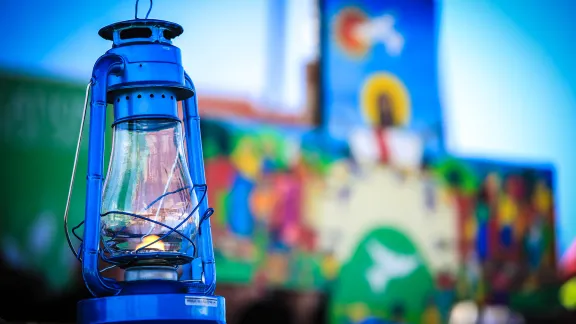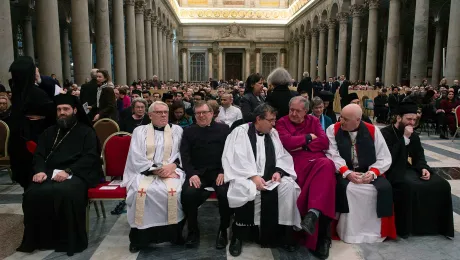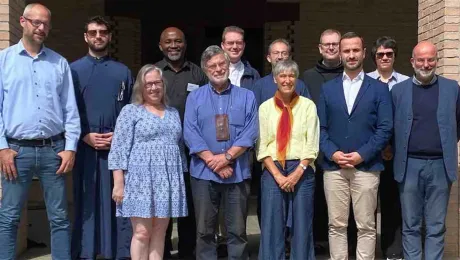
LWF partners with public theology institutes in Germany and South Africa to produce a series of resources aimed at equipping churches to strengthen their engagement in the public space. Photo: LWF/JC Valeriano
LWF joins Berlin Institute and Beyers Naudé Center to help member churches strengthen engagement in public space
(LWI) - The Lutheran World Federation (LWF) has “joined hands” with the Berlin Institute for Public Theology in Germany and the Beyers Naudé Center for Public Theology in South Africa to produce a series of resources to help member churches strengthen their engagement in the public space.
At the official launch of the open-access public theology lecture series on 15 October, LWF General Secretary Rev. Dr Martin Junge said that such resources are urgently needed at a time when "prevalent trends of individualization are leading to a disengagement from the public space.” As humanity loses a sense of the common good, he stressed, “the common ground among people and communities shrinks,” with the result that “eventually common sense goes astray.”
The LWF leader noted that churches are not exempt from such trends towards “splendid isolation,” but they are “excellently well equipped to counter these trends” by mobilizing their spiritual and theological resources. By its nature, he insisted, “faith is always personal” but “never private,” because “faith both forms community and drives towards community.”
Access to fresh and substantive theology is much needed in the global church today because it expands our theological imagination, sharpens our theological discernment and strengthens our theological commitment.
The series of public theology lectures is freely available on the websites of the three organizations in both video and audio format, with accompanying slides, study texts and suggested supplementary reading. Recorded during the COVID-19 pandemic, the lectures are presented by leading public theologians from around the globe. They include discussion on what public theology means in different contexts, including from an Islamic perspective and within the framework of a digital world.
A second section focuses on the practical application of public theology in areas such as politics and economics, peacemaking and human rights, gender and sexuality, or creation and sustainable development. During the online launch, Rev. Philip Peacock, Acting General Secretary for Programs of the World Communion of Reformed Churches, said: “The question is not why there is suffering in the world, but rather, what can we do about it and this is, of course, a very public question.”
Also welcoming the new resources was the Academic Dean of the Ecumenical Institute at Bossey, Prof. Dr Simone Sinn. Access to such “fresh and substantive theology” is much needed in the global church today, she said, because “it expands our theological imagination, sharpens our theological discernment and strengthens our theological commitment.”
Private and public spheres
Three of the contributors to the lecture series also shared insights into the importance of public theology in their different contexts. Prof. Dr Rothney Tshaka, director of the School of Humanities at the University of South Africa underlined the fact that in his country “black theology of liberation has always been public theology,” even when “it was not fashionable to speak publicly about your faith.”
Rev. Dr Seferosa Carroll, the World Council of Churches Program Executive for Mission and Mission from the Margins, explained that she grew up in the Pacific in a context where faith was largely limited to the private sphere and Sunday worship. She said she was keen to be part of the lecture series because “for me, it just became very important to actually unpack the connections between private and the public sphere.”
Another contributor, Prof. Dr Frederike van Oorschot, director of the department of Religion, Law and Culture at Germany’s Heidelberg University, highlighted the importance of discussing “how digital spaces shape our understanding of the public [sphere] and our interaction between Christians.”
The director of the Berlin Institute for Public Theology, Prof Dr Torsten Meireis, noted that the current series of lectures “is only a start,” adding that there are “many other voices that should be heard.” His words were echoed by Prof. Dr Dion Forster, director of the Beyers Naudé Center for Public Theology at Stellenbosch University, who encouraged others “to join the conversation” in the future.
LWF’s Program Executive for Public Theology and Interreligious Relations, Rev. Dr Sivin Kit, who moderated the discussion, stressed that “providing access to voices from different parts of the world, is not about “limiting ourselves to argue over definitions and concepts.” Rather, he concluded, it is about “mobilizing individuals and communities for a stronger engagement in the public space.”
See a preview of the Public Theology lecture series:
By LWF/P. Hitchen


